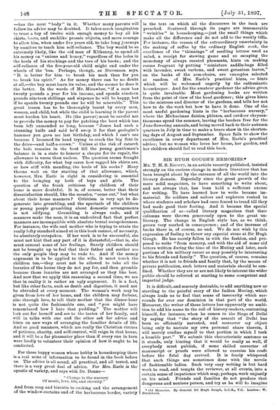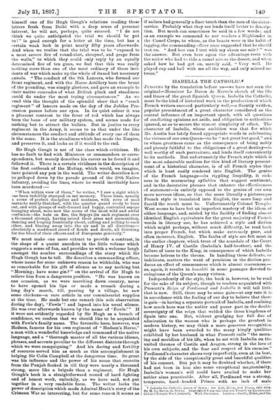SIR HUGH GOUGH'S MEMORIES.* Ma. T. H. S. ESCOTT, in
an article recently published, insisted strongly on the curious change in modern literature that has been brought about by the entrance of all the world into the literary domain. Especially since the great growth of the more solid magazines, to have something to write about, and not always that, has been held a sufficient excuse for writing. To have learned how to write became im- material. So soldiers and sailors and explorers rushed in where students and scholars had once feared to tread till they had made good their footing. And it became the special qualification of so - called literary magazines that their columns were thrown generously open to the great un- literary. The change in English style has, as we think, grown very marked in consequence ; and of the increase of books there is, of course, no end. We do not wish by this expression of feeling to throw any especial stone at Sir Hugh Gough. He has merely fallen in with the fashion, and pro- posed to write "from memory, and with the aid of some old letters written during the time of the Mutiny and later, such portions of his military career as may possibly be interesting to his friends and family." The question, of course, remains whether it is not to friends and family that, by the means of private publication, such letters and materials should be con- fined. Whether they are or are not likely to interest the wider public should be referred at starting to some competent and impartial judge.
It is difficult, and scarcely desirable, to add anything new or startling to the painful story of the Indian Mutiny, which always leads us to feel that sense of insecurity which sur- rounds for ever our dominion in that part of the world. Moreover, the writer of these letters has apparently no ambi- tion to add his name to the roll of history-makers, contenting himself, for instance, when he comes to the Siege of Delhi by saying that "the story of the assault of Delhi has been so efficiently narrated, and moreover my object being only to narrate my own personal share therein, I will merely confine myself to that portion in which I took a humble part." We submit this characteristic sentence as it stands, only hinting that it would be really as well, if everybody must publish, if some skilled corrector of manuscript or proofs were allowed to exercise his craft before the fatal day arrived. It is freely whispered that such things are sometimes done with the novels of fashionable ladies. Such very easy writing is but hard work to read, and tempts the reviewer, at all events, into a certain sense of impatience which may, perhaps, work unjustly on his mind. Friends and families do not produce that dangerous and noxious person, and try as ho will to imagine
• Old Memories. By General Sir Hugh Gough, G.C.B., V.O. London: W. Blackwood.
himself one of Sir Hugh Gough's relations reading these letters fresh from Delhi with a deep sense of personal interest, he will not, perhaps, quite succeed. "I do not think we quite anticipated the trial we should be put to !" is good enough for a letter at the time, but has a certain weak look in print nearly fifty years afterwards. And when we realise that the trial was to be "exposed to a most severe fire of round-shot, shrapnel, and grape from the walls," to which they could only reply by an equally determined fire of ten guns, we feel that this was really nothing more than one of the most ordinary of those inci- dents of war which make up the whole of its sad but necessary annals. "The conduct of the 9th Lancers, who formed our front regiment, and with the Horse Artillery bore the brunt of the pounding, was simply glorious, and gave an example to their native comrades of what British pluck and steadiness could do under the most trying circumstances." As we read this the thought of the splendid show that a "crack regiment" of lancers made on the day of the Jubilee Pro- cession passes before our eyes. In its quiet colour it was a pleasant contrast to the fever of red which has always been the bane of our military system, and seems made for nothing but to attract the bullets. But in justice to every regiment in the Army, it seems to us that under the like circumstances the conduct and attitude of every one of them is the same. It is the steadiness which has made the Empire, and preserves it, and looks as if it would to the end.
Sir Hugh Gough is not of the class which criticises. He has no fault to find with Ministers or commanders or corre- spondents, but merely describes his career as he found it and followed it. There is a certain vividness in the description of the first outbreak of the Mutiny, which would, we imagine, have pointed any pen in the world. The writer describes how he galloped down by the parade ground of the 20th Native Infantry, avoiding the lines, where he would inevitably have been murdered :—
"When within view of them," he writes," I saw a sight which has been indelibly stamped on my memory. These lines, usually
scene of perfect discipline and neatness, with rows of mud oarracks neatly thatched, with the quarter guard ready to turn out, and with groups of well-dressed and happy, contented sepoys lounging about, were now the scene of the most wild and awful confusion—the huts on fire, the Sepoys (in each regiment over a thousand strong), having seized their arms and ammunition, dancing and leaping frantically about, calling and yelling to each other, and blazing away into the air and in all directions— absolutely a maddened crowd of fiends and devils, all thirsting for the blood of their officers and of Europeans generally."
We must make one more extract to provide a contrast, in
the shape of a quaint anecdote in the little volume which suggests a sense of fun, and provides us with a welcome laugh amongst the sombre surroundings of the story which Sir Hugh Gough has to tell. He describes a commanding officer, whose name for some unknown reason he withholds, who was so remarkable for his gift of silence as to say nothing but "Morning; have some gin ?" on the arrival of Sir Hugh to relieve him from a dangerous position. "He was known on one occasion, as we were marching down country, never to have opened his lips or made a remark during a. long day's march, till, passing by a village, he saw some chickens—a rare article in our commissariat supplies at the time. He made but one remark (his sole observation during the day), ' Fowls ' ! and lapsed into his usual silence. He was ever afterwards known by the name of Fowls.' " If it were not evidently regarded by Sir Hugh as a breach of confidence, we confess that we should like to be acquainted with Fowls's family name. The favourite hero, however, was Hodson, famous for his own regiment of " Hodson's Horse," a man with a wonderful knowledge and command of the native language, and a "thorough master of all the various idioms, phrases, and accents peculiar to the different districts through which we were campaigning." And his daring and fertility of resource served him as much as this accomplishment in helping Sir Colin Campbell at the dangerous time. So great was his influence and the power of his name that recruits from the Punjab flosked in till they were nearly a thousand strong, more like a brigade than a regiment. Sir Hugh G-ough's book is a straightforward record of hard fighting and of honest work, unluckily, as we have said, not put together in a very readable form. The writer lacks the power of description which made Admiral Heath's story of the Crimean War so interesting, but for some reason it seems as
if sailors had generally a finer touch than the men of the sister.. service. Probably what they see lends itself better to descrip- tion. But much can sometimes be said in a few words ; and as an example we commend to our readers a Highlander in the Camel Corps, to whom, as the beasts were in the habit of lagging, the commanding officer once suggested that he should trot on. "And hoo can I trot with my sheen sae sair P" was the answer. But even here again the advantage rests with the sailor who had to ride a camel across the desert, and when asked how he had got on, merely said, "Very well. He played cup and ball with me all the way, and only missed me twice."







































 Previous page
Previous page